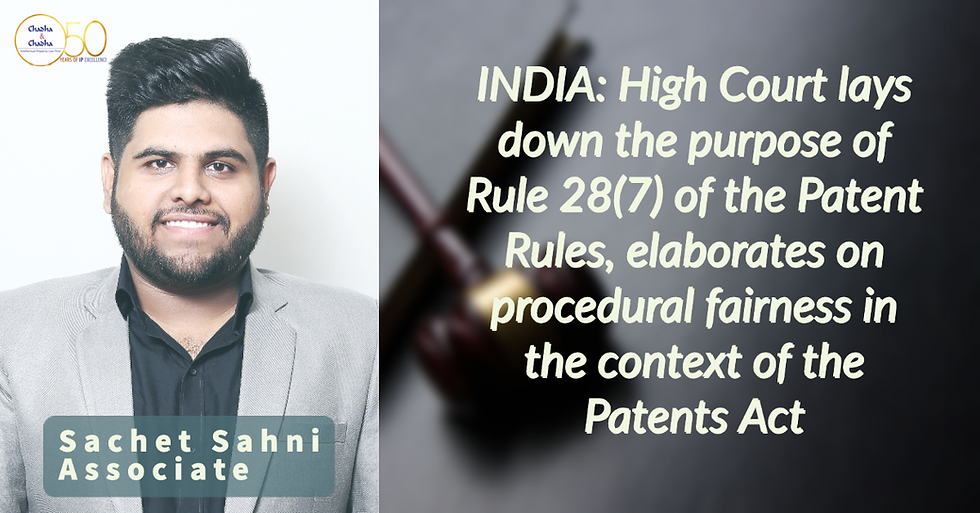High Court elaborates on procedural fairness in the context of the Patents Act

The Hon’ble High Court (“the Court”) in the matter of FMC Corporation V. Assistant Controller of Patents and Designs, set aside the impugned order dated 10 May 2022 and sent the matter back for consideration of the Patent Office despite unwarranted delays by the Appellants, affirming that the order lacks a proper reasoning.
The Court delved into the importance of Rule 28(7) of the Patent Rules establishing that the provision cannot be used as a tool to reopen the entire debate. However, considering that patent rights are valuable, the Court ruled in favor of the Appellants.
BRIEF FACTS
· On 10 September 2019, the FMC Corporation (herein referred to as “Appellant”) filed the patent application numbered 201917036361, for the invention titled ‘Herbicidal Mixtures’, with 13 claims. The First Examination Report (‘FER’) generated on 26 March 2021 stated objections pertaining to inventive step and non-patentability, along with other notable objections. The FER delineated the non-establishment of the effectiveness of the alleged compositions over the prior art. In line with the objections, the Appellant filed a reply to the FER on 24 September 2021, along with the amended claims and reduced the total claims to 5.
· The learned Controller, upon further examination, issued a hearing notice dated 24 February 2022 and hearing was scheduled on 11 March 2022. However, the hearing date was deferred to 23 March 2022 due to adjournment sought by the Appellant. The rescheduled hearing was duly attended by the Appellant’s patent agent and the objections were thoroughly addressed.
· In a rather unexpected move, the Appellant failed to file the written submissions within the prescribed time period. Initially, the learned Controller granted the Appellant’s request for extension under Rule 138 of the Patent Rule, 2003. However, the Appellant’s second request for extension on 3 May 2022, under Rule 137 was refused by the learned Controller. In a separate order, the Controller rejected the patent application under Section 15 of the Patents Act, vide an order dated 10 May 2022.
· Thereafter, the Appellant filed a review petition on 10 June 2022 u/s 77(1)(f) and 77(1)(g) of the Act. Besides, the Appellant filed another application on 12 July 2022 for amending the Appellant’s name in whose favour the patent application would be assigned. In support of the review application, the Appellant filed yet another submission on 8 August 2022, consisting of a solitary claim.
PROMINENT ARGUMENTS BY COUNSELS
· The learned counsel for the Appellant contended that the impugned order is totally unreasoned. The counsel further submitted that the Respondent’s rejection is merely on the basis of non-filing of written submissions and additional data within the recommended time frame.
· The learned counsel for the Respondent, contended that the Appellant had failed to furnish the required information to establish the effectiveness of the claimed invention despite being given ample time since the issuance of FER in March 2021. The counsel further submitted that the Appellant was attempting to override the provisions of the Act and the decision rendered by the Respondent in the rejection order isn’t worthy of judicial intervention.
OPINION OF THE BENCH
· The Hon’ble Court noted that the Appellant had adequate time to file the written submissions and supplementary data to establish the invention’s effectiveness. It is quintessential to mention that Rule 28(7) of the Patent Rules, 2003 stipulates that the written submissions and relevant documents must be filed within fifteen days from the hearing date.
· Emphasizing the objective of Rule 28(7), the Hon’ble Court placed reliance on Hawar Technologies Limited v. The Assistant Controller of Patents [OA/56/2020/PT/DEL, decision dated 12th October 2020] wherein the erstwhile IPAB outlined the purpose of Rule 28(7) of the Rules confirming that the said principle ensures that the applicants are entitled to a fair and substantial hearing. The order delineates that the patent applications are technical in nature and hence require the application of legal as well as technical principles by the Patent Controllers. Therefore, it is necessary to conduct a proper hearing along with the written submissions so that the Controllers can reach an opinion and procedural fairness is also maintained.
· The purpose of Rule 28(7) of the Rules is thus to capture the submissions made during the hearing and to take any steps which the Controller may have directed in terms of filing of forms or amendments, if any. The written submissions and filing of relevant documents under Rule 28(7) of the Rules must not be used as a medium to reopen the entire discussion. Rather, it’s purpose is to act as a brief for the substantial discussions that have already been deliberated and agreed upon during the hearing process. The next step ahead should always be moving towards the closure of the patent application.
· The Hon’ble Court further stressed that irrespective of delay on Appellant’s part to file the written submissions, the learned Controller ought to consider the response to FER and substantive arguments made during the hearing process and subsequently, give a rational decision.
FINAL JUDGMENT
· The Hon’ble Court deliberated on the facts and concluded that the Applicant is substantially to be blamed for the delay in consideration of its application. However, since patent rights are valuable rights and rejection of the patent application can have serious consequences on the Applicant, the Court, owing to peculiar facts of the case, allowed the appeal and sent back the matter for fresh consideration, only on the basis of amended one claim.
· In addition, the Hon’ble Court implied costs of Rs.1,00,000 upon the Appellant and concluded that the Respondent shall decide the matter within two months from the date of receipt of this order.
CONCLUSION
The present case provides an interesting equilibrium approach of the Court in protecting the rights of the Applicants against unreasoned refusal orders as well as maintaining sanctity of patent procedure timelines by levying costs in case of unwarranted delays.








































Comments